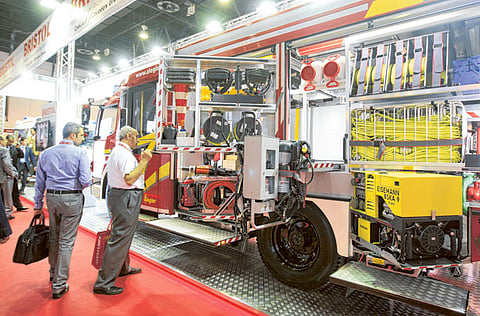Sales of fire safety products heat-up
Market for fire prevention systems to reach $1.12b in 2013

Dubai: Following the spate of fires that broke out in a number of towers in Dubai last year, manufacturers and suppliers of fire safety products in the UAE are expecting blazing sales fuelled by increasing awareness of fire prevention.
Naffco, a major local manufacturer of fire safety products, forecasts an eight percent increase in sales during 2013, said Khalid Al Khatib, chief executive of Naffco, which has a 35 to 40 per cent share of the market.
The UAE’s fire equipment and systems market is estimated to be worth Dh2 billion, according to Al Khatib.
In the GCC, the market for fire detection and suppression systems is expected to reach $1.12 billion (Dh4.11 billion) in 2013, according to the organizers of the Intersec exhibition inaugurated yesterday.
“High-rise buildings and fire security in general has increased our exports by 50 to 60 percent for fire fighting and security products,” according to one Naffco manager, who declined to be named. “If there is a fire anywhere, these products can turn any one of us into a fire fighter. It’s easier to deal with a small fire than face a big one.”
Businesses can save millions of dirhams in training their staff to put out fires rather than face the cost of damages from an uncontained fire, experts suggested.
The “weakest link” in the system lies in the management of buildings like hotels or malls after they have been taken over by tenants, said Michael Kelly, Director of Fire Safety Engineering at the Emaar Malls Group, before a presentation on managing fire risks at malls.
“Once the building is occupied, the person that occupies it has the high skills to run a mall but they need to have a clear understanding of safety aspects of how the building operates,” he said. “There is a lack of awareness from the tenants on the fire systems. I ask managers if they have read the fire strategy and they say ‘what’s a fire strategy.’ They don’t understand the terminology.”
Business should invest in giving the building managers accredited fire safety training—a low cost move that could prevent far more costly damage in case a fire broke out and could not be contained by untrained staff, he said.
During Intersec, he was looking for a fire-simulator system, environmentally-friendly and reusable, that would train staff in a controlled environment to put out a fire, he said.
This is part of the Emaar Mall Group’s fire safety program implemented in 2012, he said.
One such fire simulator cost about 5000 Euros—a small price to pay to avoid costlier damages from uncontained fires, he added.
The Fire and Rescue section at Intersec grew 33 percent this year to 230 exhibitors participating in the exhibition.
The recent UAE Fire and Life Safety Code of Practice, Fire and Rescue is expected to generate interest in fire safety products, organisers said.
Sign up for the Daily Briefing
Get the latest news and updates straight to your inbox
![Latest discovery follows several 1,000-tonne-plus gold finds in the past year. [Illustrative image]](http://media.assettype.com/gulfnews%2F2024-11-27%2F9rs31cwr%2FStock_Gold_Mining_18c61d0bfc2_original_ratio.jpg?w=320&auto=format%2Ccompress&fit=max)

